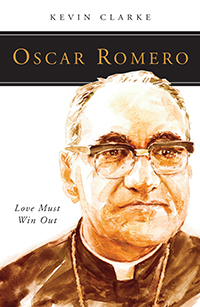
Friday Favourites: Óscar Romero: Love Must Win Out
 Love Must Win Out opens with the assassination of Óscar Romero, and it has all the elements of a thriller: secret teams of gunmen in silent cars, the archbishop lifting the host above his head in grave prayer, the shot that cracks across the air and the screams that erupt in the chapel as he crumples behind the altar.
Love Must Win Out opens with the assassination of Óscar Romero, and it has all the elements of a thriller: secret teams of gunmen in silent cars, the archbishop lifting the host above his head in grave prayer, the shot that cracks across the air and the screams that erupt in the chapel as he crumples behind the altar.
It’s cinematic—and several movies have been made out of it. We watched Romero with Raúl Juliá in class when we were kids. But then Love Must Win Out goes on to open up and explore Romero’s entire life, inside and out, and reveal the man behind the story.
Kevin Clarke is a thorough and diligent writer. He puts together his narrative carefully, piece by piece, and examines every possible angle. What stands out most are the intimate moments: the little boy running around with a paintbrush sprinkling water on top of his friends and blessing them, the young priest sharing letters and stories from people over the radio, Romero losing his temper and storming off from a Mass that had devolved into a shouting match.
Romero comes across as more human than symbol in Love Must Win Out. He was conflicted and suspicious, torn between politics and the Church. His siblings remembered him as ‘prayerful, too serious, perhaps a little sad, always “turned inwards” … “My brother thought too much,” one recalled’. In middle age he was characterized as a stubborn scold, longing ‘to live as a real pastor, not as an insufferable bureaucrat’ and yearning for personal connection.
Clarke doesn’t shy away from the political aspects of Romero’s story, nor the controversy surrounding his beatification process. But what he emphasizes above all else is Romero as a religious man, and a person of the people: housing alcoholics and homeless old people in the church convent as a priest, protecting the town’s shoeshine boys and organizing them into a self-help collective. One story goes:
“Some of the fine women of San Miguel got the idea that Romero’s simple, even shabby, room at the rectory was an embarrassment. They conspired to fix up the room with a fine bed, linens, and elegant curtains when Romero was away. But when he returned Father Romero was furious to discover the transformation and gave everything away to people passing in the street, restoring his simple cot and old chair and fuming about the manipulative impulses of the wealthy. It was fine for him to collect money for the poor from them, but Romero personally would not be bought off so cheaply.” (pg. 43)
If this sounds familiar to you, it’s deliberate. “Archbishop Romero and Pope Francis seem to follow parallel tracks,” Clarke writes in his introduction, and it is during Francis’s papacy that the process of making Romero a saint is moving forward. Both men share the same vision of a church for the poor and dispossessed and both men, as Clarke puts it, “have demonstrated the powerful works that liberation and joy and courage can achieve.”
If his death was memorable, Love Must Win Out makes Romero’s life even more so, and reminds us that his spirit is alive even today.
-Gillian Robinson, Production Editor


